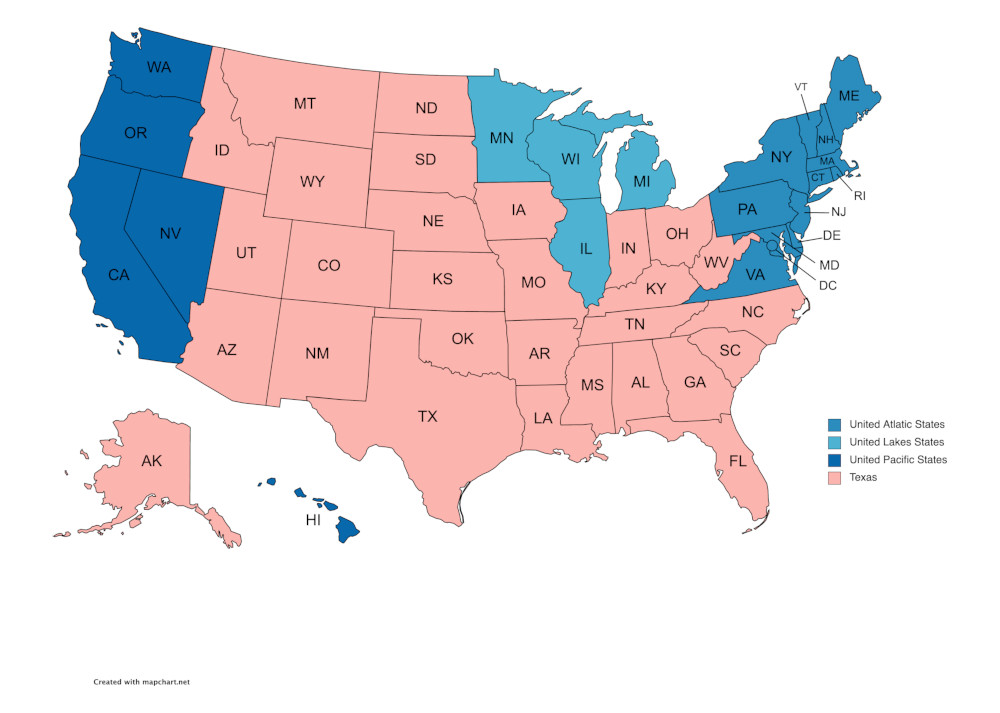If so, then what new countries should be formed?

The first paragraph of the US Declaration of Independence (https://www.archives.gov/founding-docs/declaration-transcript) states:
When in the Course of human events, it becomes necessary for one people to dissolve the political bands which have connected them with another, and to assume among the powers of the earth, the separate and equal station to which the Laws of Nature and of Nature’s God entitle them, a decent respect to the opinions of mankind requires that they should declare the causes which impel them to the separation.
On the day before Election Day 2022, I think that it is pretty clear that the “political bands which have connected” the 50 US states are no longer equitable.
Without a doubt, the single biggest mistake that the US Founding Fathers made was the Senate. The Senate is anti-democratic and gives disproportionate power (including veto power by way of the filibuster) to small, mostly rural, mostly white areas at the expense of large mostly urban, mostly black areas. In addition, the Senate holds the keys to various appointments (including the President’s Cabinet and Justices of the US Supreme Court). In recent years, the Senate has delayed and denied nominations from one party and accelerated nominations from another party, which is also anti-democratic. Add the Electoral College to the mix and you have an argument that the office of the President itself is not determined in a democratic manner. This leaves all three branches of the government: executive, legislative, and judicial andi-democratic and broken.
So perhaps, in the spirit of the Declaration of Independence, it’s time to “impel them into the separation.” Perhaps the American experiment is over.
What would the former USA look like going forward? How about these 4 countries:
1. United Atlantic States
This would include the six New England states (Connecticut, Maine, Massachusetts, New Hampshire, Rhode Island, and Vermont) as well as other states mostly bordering the Atlantic Ocean: Delaware, Maryland, New Jersey, New York, Pennsylvania, and Virginia. Statehood would be granted to the District of Columbia and Puerto Rico, giving this country 14 states. Politically, the United Atlantic States would be medium blue.
2. United Lakes States
This would include four states in the Great Lakes region: Illinois, Michigan, Minnesota, and Wisconsin. Politically, the United Lakes States would be light blue.
3. United Pacific States
This would include five states mostly bordering the Pacific Ocean: California, Hawaii, Nevada, Oregon, and Washington. Politically, the United Pacific States would be dark blue.
4. Texas
Texas used to be its own country, so that seems a logical name for the remaining 29 mostly landlocked states:
- Alabama
- Alaska
- Arizona
- Arkansas
- Colorado
- Florida
- Georgia
- Idaho
- Indiana
- Iowa
- Kansas
- Kentucky
- Louisiana
- Mississippi
- Missouri
- Montana
- Nebraska
- New Mexico
- North Carolina
- North Dakota
- Ohio
- Oklahoma
- South Carolina
- South Dakota
- Tennessee
- Texas
- Utah
- West Virginia
- Wyoming
Politically, the country of Texas would be red.
Each country is contiguous, which is important considering how the United Nations defines a country. Also, this would encourage left-leaning residents in red areas to move to blue ones and vice-versa, meaning that there would be less political division within each country.
Democracies do not last forever (https://www.weforum.org/agenda/2019/08/countries-are-the-worlds-oldest-democracies/). Just like trees do not live forever. When a tree falls in the forest, it decomposes and becomes fertilizer for new trees.
Democracy in the USA has been decomposing for quite some time now. Perhaps it’s time to look the the future to see what new democracies can be fertilized. The Founding Fathers did not fear change, we should not either.

Failed Pols (https://www.failblog.com) was founded in the fall of 2016 to shine light on Failed Policies, Politicians, & Politics. From all parties.




